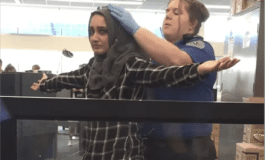LAS VEGAS – The company stacked brochures in funeral parlors around Sin City. On the cover: a couple clasping hands. Above the image, a promise: “Providing Options in Your Time of Need.”
The company, Southern Nevada Donor Services, offered grieving families a way to eliminate expensive funeral costs: free cremation in exchange for donating a loved one’s body to “advance medical studies.”
Outside Southern Nevada’s suburban warehouse, the circumstances were far from comforting. In the fall of 2015, neighboring tenants began complaining about a mysterious stench and bloody boxes in a Dumpster. That December, local health records show, someone contacted authorities to report odd activity in the courtyard.
Health inspectors found a man in medical scrubs holding a garden hose. He was thawing a frozen human torso in the midday sun.
As the man sprayed the remains, “bits of tissue and blood were washed into the gutters,” a state health report said. The stream weaved past storefronts and pooled across the street near a technical school.
Southern Nevada, the inspectors learned, was a so-called body broker, a company that acquires dead bodies, dissects them and sells the parts for profit to medical researchers, training organizations and other buyers. The torso on the gurney was being prepared for just such a sale.
Each year, thousands of Americans donate their bodies in the belief they are contributing to science. In fact, many are also unwittingly contributing to commerce, their bodies traded as raw material in a largely unregulated national market.
Body brokers are also known as non-transplant tissue banks. They are distinct from the organ and tissue transplant industry, which the U.S. government closely regulates. Selling hearts, kidneys and tendons for transplant is illegal. But no federal law governs the sale of cadavers or body parts for use in research or education. Few state laws provide any oversight whatsoever, and almost anyone, regardless of expertise, can dissect and sell human body parts.
“The current state of affairs is a free-for-all,” said Angela McArthur, who directs the body donation program at the University of Minnesota Medical School and formerly chaired her state’s anatomical donation commission. “We are seeing similar problems to what we saw with grave-robbers centuries ago,” she said, referring to the 19th-century practice of obtaining cadavers in ways that violated the dignity of the dead.
“I don’t know if I can state this strongly enough,” McArthur said. “What they are doing is profiting from the sale of humans.”
The industry’s business model hinges on access to a large supply of free bodies, which often come from the poor. In return for a body, brokers typically cremate a portion of the donor at no charge. By offering free cremation, some deathcare industry veterans say, brokers appeal to low-income families at their most vulnerable. Many have drained their savings paying for a loved one’s medical treatment and can’t afford a traditional funeral.
“People who have financial means get the chance to have the moral, ethical and spiritual debates about which method to choose,” said Dawn Vander Kolk, an Illinois hospice social worker. “But if they don’t have money, they may end up with the option of last resort: body donation.”
Few rules mean few consequences when bodies are mistreated. In the Southern Nevada case, officials found they could do little more than issue a minor pollution citation to one of the workers involved. Southern Nevada operator Joe Collazo, who wasn’t cited, said he regretted the incident. He said the industry would benefit from oversight that offers peace of mind to donors, brokers and researchers.
“To be honest with you, I think there should be regulation,” said Collazo. “There’s too much gray area.”
Read the full article on Reuters: http://reut.rs/2yPxhXR






Leave a Reply